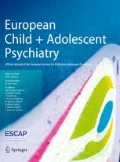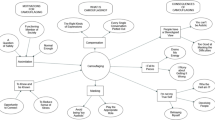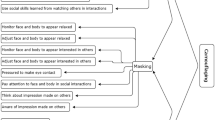Abstract
Research on emotion understanding in ADHD shows inconsistent results. This study uses control methods to investigate two questions about recognition and understanding of emotional expressions in 36 five- to eleven-year-old boys with ADHD: [1] Do they find this task more difficult than judging non-emotional information from faces, thus suggesting a specific social-cognitive impairment? [2] Are their judgements about faces impaired by general limitations on task performance, such as impulsive responding? In Part 1, 19 boys with ADHD and 19 age-matched typically developing boys matched facial expressions of emotion to situations, and did a control non-emotional face-processing task. Boys with ADHD performed more poorly than age-matches on both tasks, but found the emotion task harder than the non-emotion task. In Part 2, 17 boys with ADHD and 13 five-to six-year-old typically developing boys performed the same tasks, but with an ‘inhibitory scaffolding’ procedure to prevent impulsive responding. Boys with ADHD performed as well as the younger controls on the non-emotional task, but still showed impairments in the emotion task. Boys with ADHD may show poorer task performance because of general cognitive factors, but also showed selective problems in matching facial emotions to situations.
Similar content being viewed by others
References
Baron-Cohen S, Tager-Flusberg H, Cohen D (1993) (eds) Understanding other minds: perspectives from Autism. Oxford University Press
Buitelaar JK, Rothenberger A (2004) Foreword – ADHD in the scientific and political context. Eur Child Adolesc Psychiatry Suppl 1(13):1–6
Davies S, Bishop D, Manstead ASR, Tantam D (1994) Face perception in children with autism and Asperger’s Syndrome. J Child Psychol Psychiatry 35:1033–1057
Downs A, Smith T (2004) Emotional understanding, cooperation, and social behavior in high-functioning children with autism. J Autism Dev Disord 34:625–635
Friedman S, Rapport L, Lumley M, Tzelepis A, VanVoorhis A, Stettner L, Kakaati L (2003) Aspects of social and emotional competence in adult attention-deficit/hyperactivity disorder. Neuropsychology 17:50–58
Frith U, Happe F (1994) Autism: Beyond Theory of Mind. Cognition 50:115–132
Greene RW, Biederman J, Faraone SV, Ouellette CA, Penn C, Griffin SM (1996) Social disability in children with ADHD. J Am Acad Child Adolesc Psychiatry 35:571–578
Geurts H, Verte S, Oosterlaan J, Roeyers H, Sergeant J (2004) How specific are executive functioning deficits in attention-deficit hyperactivity disorder and autism? J Child Psychol Psychiatry 45:836
Guevremont DD, Dumas MC (1994) Peer relationship problems and disruptive behavior disorders. J Emotional Behav Disord 2:164–172
Hobson RP (1986) The autistic child’s expression of emotion. J Child Psychol Psychiatry 27:321–342
Hobson RP (1991) Methodological issues for studies on autistic individuals’ perception and understanding of emotion. J Child Psychol Psychiatry 32:1135–1158
Hobson RP, Ouston J, Lee A (1988) What’s in a face? The case of autism. Br J Psychol 79:441–453
Landau S, Moore LA (1991) Social skill deficits in children with attention-deficit hyperactivity disorder. School Psych Review 20:235–251
Luteijn E, Serra M, Jackson S, Steenhuis M, Althaus M, Volkmar F, Minderaa R (2000) How unspecified are disorders of children with a pervasive developmental disorder not otherwise specified? A study of social problems in children with PDD-NOS and ADHD. Eur Child Adolesc Psychiatry 9:168–179
Oosterlaan J, Sergeant JA (1996) Inhibition in ADHD, aggressive, and anxious children: a biologically based model of child psychopathology. J Abnorm Child Psychol 24:19–36
Singh SD, Ellis CR, Winton ASW, Singh NN, Leung JP, Oswald DP (1998) Recognition of facial expressions of emotion by children with attention-deficit hyperactivity disorder. Behav Modif 22:128–142
Ullman RK, Sleator EK, Sprague RL (1991) ACTeRS parent form. Metritech Inc., Champaign, Illinois
Wechsler D (1991) Manual for the wechsler intelligence scale for children, 3rd edn. The Psychological Corporation, San Antonio, TX
Author information
Authors and Affiliations
Corresponding author
Rights and permissions
About this article
Cite this article
Yuill, N., Lyon, J. Selective difficulty in recognising facial expressions of emotion in boys with ADHD. Eur Child Adolesc Psychiatry 16, 398–404 (2007). https://doi.org/10.1007/s00787-007-0612-5
Accepted:
Published:
Issue Date:
DOI: https://doi.org/10.1007/s00787-007-0612-5




